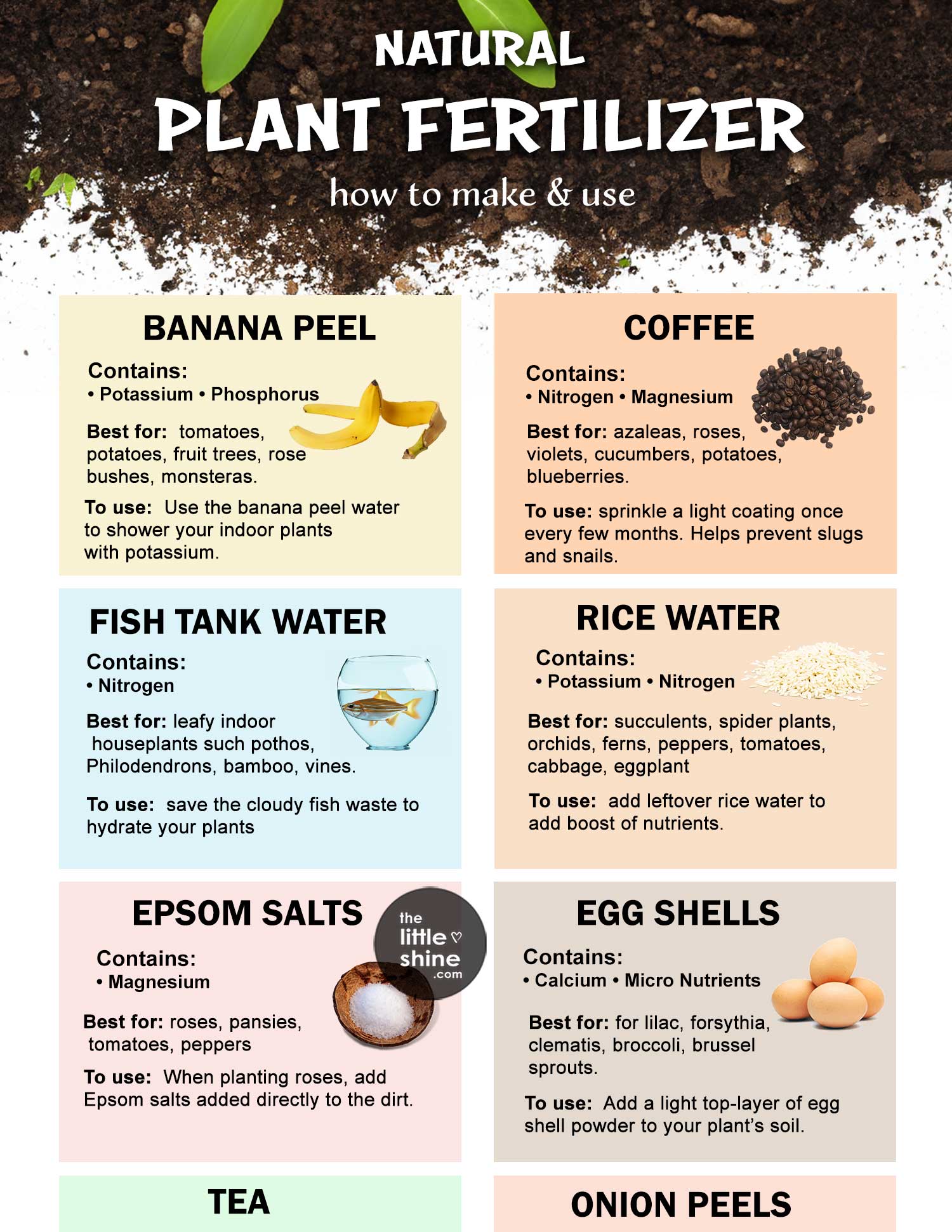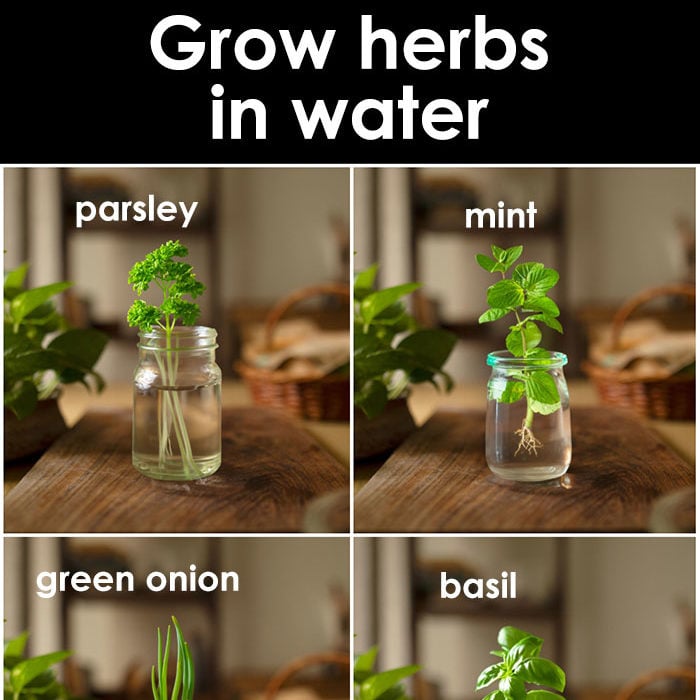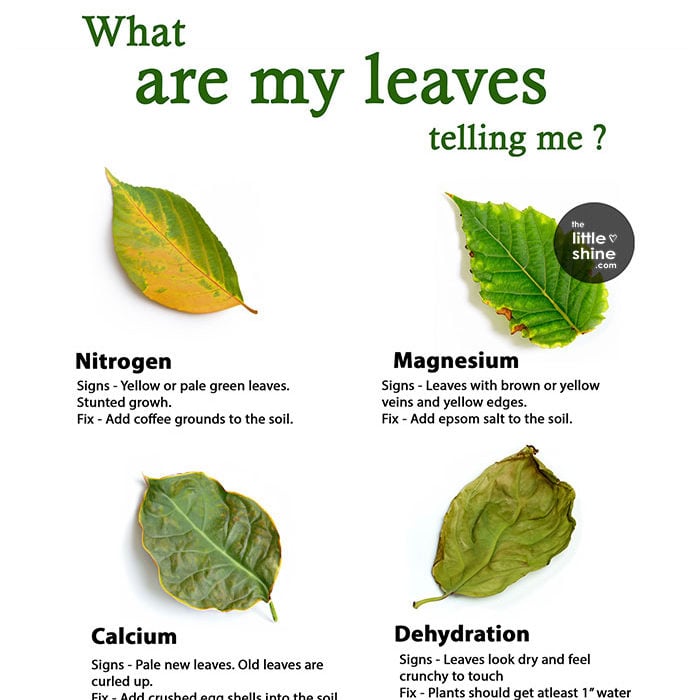Your plants need essential nutrients in their diet to grow healthy and fight off harmful diseases. These six essential nutrients are nitrogen, phosphorus, potassium, magnesium, sulfur and calcium.

The best ways to make natural organic plant fertilizers is to reuse the food scraps from your kitchen that you’d typically throw away and use them in your garden for active & healthy growth of plants.
Make natural plant fertilizers using food scraps –
1. Banana Peels:
Banana peels are good fertilizers for gardens, especially indoor plants as they contain 42% of potassium which is one of the three major components of fertilizers along with nitrogen and phosphorous.
It can help strengthen the roots of the plants and enable good distribution of water and nutrients to the plant.
How to make it: Chop up some organic banana peels and bury them along side your vegetable garden.
Chop up banana peels from organic bananas and place them in a glass jar with water. Leave the peels in the water for three days and after 3 days strain the peels. For every 2 cups of banana peel water, add 2 cups of normal water.
How to use it: use this water to water the plants once a week. Pour it around the outer base of the plant to reach the roots.
Best for: tomatoes, potatoes, fruit trees, rose bushes, Monsteras, and Tillandsias.
2. Rice Water:
Rice water can help transmit important bacteria to Lactobacilli in plant roots.
Rice water contains proteins, fibre, amino acids, calcium, phosphorous, iron, zinc and potassium, which is beneficial to the plants and acts as a natural plant fertilizer.
How to make it: Bring two cups of water (no salt!) to boil in a small pot or saucepan. Add half a cup of uncooked rice to the boiling water. Boil rice until the water gets cloudy and murky, and allow to cool.
Using a fine-mesh strainer, strain the rice water from the rice grains, saving the starch-rich liquid in a jar or bowl.
How to Use it: simply add the rice water to your watering can and use it on your plants once a month.
Best for – plants that prefer slightly acidic soil, such as peppers, tomatoes, ferns, various types of succulents, spider plants and African violets.
3. Coffee:
Coffee grounds (or remnants once your coffee is brewed or prepared) are a rich source of nitrogen to the plants which can help aid their growth and stem strength. Coffee also contains calcium and magnesium which can be beneficial to plant health.
How to Use it: Collect your used coffee grounds and lightly spread them over your plant’s soil once every few months.
Best for – azaleas, rhododendrons, roses, African violets, cucumbers, potatoes, and blueberries.
4. Onion Peels:
Onion peels are rich in antioxidant and antimicrobial properties and contain substances like sulphur, quercetin, potassium, phosphorus, zinc, iron, iodine etc, which can be beneficial for both indoor and outdoor plant health.
How to make it: In a container of 1 to 1.5 litres, add in the peels of 5 to 6 onions and top it up with 1 litre of water and let it sit for 24 to 48 hours.
You will notice that the water colour has turned into a pinkish purple shade which is similar to the colour of the peels. Strain this water into a watering can or spray can and use it on your plants every 15 to 20 days.
5. Tea leaves:
Since tea leaves are organic in nature, they can improve the structure and quality of your soil and increase soil drainage by helping and aiding healthy aeration for the plant roots and retain the moisture and nutrients in the soil.
How to make it: Simply add any used green tea grounds to a jar and fill it with water. Let the tea leaves and water sit for 24 hours.
How to Use it: Spraying cold tea on leaves can help ward off fungal diseases that some plants can suffer from.
You may strain the compost tea first, or you can directly pour the compost onto the soil of your plant beds.
Best for – Red leaf lettuce, sweet corn, and soybeans
6. Egg shells:
Egg shells are rich in calcium and can specially provide a fertilizing effect to vegetable plants and even to the other plants as it contains potassium, sodium etc.
These substances can provide a fertilizing effect and can be used to supplement your regular fertilizing regime and improve plant health.
How to make it: Collect around 6-12 shells and wash it under running water and let it dry completely over 5 to 7 days in sunlight. Then grind into a smooth powder, the completely dried egg shells and store the powder in a container.
How to Use it: You can use this powder for fertilizing your plants. For a pot of 6 to 10 inches in diameter, sprinkle around 1 tablespoon of ground eggshell powder and gently mix it up with the top layer of the soil.
Best for – lilac, forsythia, clematis, broccoli and Brussel sprouts.
7. Epsom Salt –
Epsom salts is one of the most important organic fertilizers you can use for roses. It is full of magnesium and sulphate which helps the functioning of the plants.
Magnesium aids in photosynthesis while sulphate boosts the plant’s power to intake nutrients.
How to make it: Dissolve 2 tablespoons of Epsom salts into a gallon of water. Shake and use as a spray on both indoor and outdoor plants.
How to Use it: Add Epsom salts directly to the dirt while planting roses to encourage the bush to generate more flowers during the blooming season.
Best for – roses, pansies, tomatoes and peppers as well as shrubs like azaleas, rhododendrons and evergreens.
8. Fish Tank Water
Fish excrete waste is packed with plant-loving organic nutrients.
How to use it: Clean out your aquarium water as usual but save the cloudy fish waste to hydrate your plants once a month.
Best for: golden pothos, Philodendrons, bamboo, arrowhead vines, or dumb canes.


